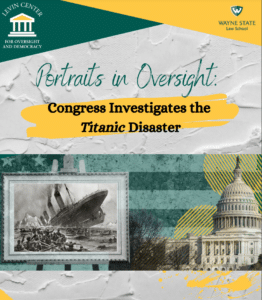
Today, the Levin Center for Oversight and Democracy, in collaboration with the U.S. Capitol Historical Society, is releasing a Portrait in Oversight describing how 1912 hearings by the U.S. Congress into the sinking of the Titanic led to key maritime safety reforms, including the International Convention for the Safety of Life at Sea (SOLAS) and the International Ice Patrol led by the U.S. Coast Guard, both of which have been saving lives for nearly 50 years.

“The Titanic investigation demonstrates how Congress can investigate the facts behind a disaster and take action to safeguard the public,” said Jim Townsend, director of the Levin Center. “The new Portrait in Oversight commemorates the bipartisan congressional work that exposed the Titanic’s safety failures and sparked national and international reforms, reminding Congress and the rest of us of what is possible when we work together to counter threats to public safety.”
“Titanic’s breathtaking design, gross class disparities, and shocking loss of life still make its sinking feel as relevant today as it did on that tragic night,” said Jane L. Campbell, President and CEO of the U.S. Capitol Historical Society. “But perhaps the greatest reason we struggle to accept the loss of those 1,500 souls is because their deaths were one of the great preventable tragedies in history. Congress’ special investigation discovered that the Titanic was traveling at high speeds, even while ice warnings were ignored, and that too few lifeboats were on board for the ship’s number of passengers. Congress, thus, worked to immediately reform maritime law and institute key precautions to ensure that such a night to remember is never forgotten.”
This portrait is the latest in a series of profiles developed by the Levin Center of notable congressional investigations and key figures in the history of congressional oversight from 1792 to the modern era.